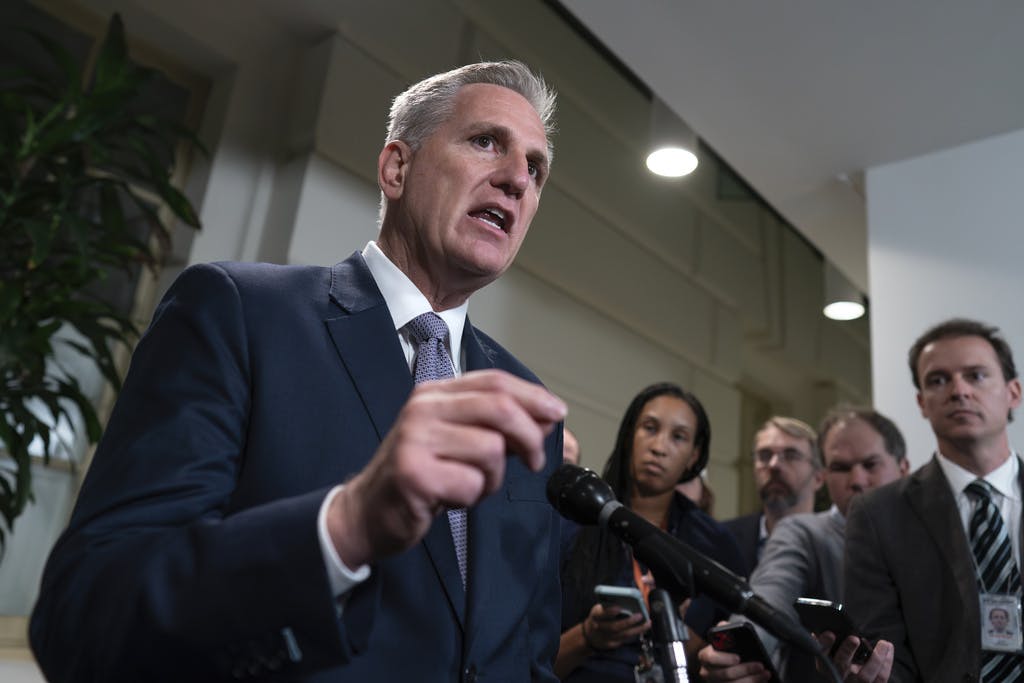As Shutdown Looms, McCarthy, Risking Speakership, Pivots to a 45-Day Funding Plan That Depends on Democratic Help
‘If somebody wants to remove me because I want to be the adult in the room, go ahead and try,’ the speaker says of the threat to oust him.

WASHINGTON — On the brink of a federal government shutdown, Speaker McCarthy announced a dramatic pivot Saturday, trying to push a 45-day funding bill through the House with Democratic help — a move that could keep the federal government open but most certainly risks his job.
Republican lawmakers met behind closed doors early in the morning with hours to go before the midnight deadline needed to fund government operations or face a disruptive federal closure.
The new approach would leave behind aid to Ukraine, a White House priority opposed by a growing number of GOP lawmakers, but the plan would increase federal disaster assistance by $16 billion, meeting President Biden’s full request.
The House was preparing for a quick vote Saturday on the plan, but Democrats hit the brakes, seeking time so they could read the 71-page bill. Across the Capitol, the Senate was opening a rare weekend session and hoping to advance its own stopgap plan, but with money for Ukraine.
“We’re going to do our job,” Mr. McCarthy said after the morning meeting. “We’re going to be adults in the room. And we’re going to keep government open.”
With no deal in place before Sunday, federal workers will face furloughs, more than 2 million active-duty and reserve military troops will work without pay and programs and services that Americans rely on from coast to coast will begin to face shutdown disruptions.
The sudden House action would fund government at current 2023 levels for 45 days, through November 17. It would move closer to the bipartisan approach underway in the Senate, which also would fund the government through that period, while adding $6 billion for Ukraine to fight the war against Russia and $6 billion for U.S. disaster relief.
“A bipartisan, a bicameral solution is the only way forward,” said Representative Rosa DeLauro, the top Democrat on the House Appropriations Committee. She and other Democrats decried cutting Ukraine aid.
Mr. McCarthy will be forced to rely on Democrats for passage because the speaker’s hard-right flank has said it will oppose any short-term measure.
Mr. McCarthy was setting up a process for voting that will require a two-thirds supermajority, about 290 votes in the 435-member House for passage. Republicans hold a 221-212 majority, with two vacancies.
Relying on Democratic votes and leaving his right-flank behind is something that the hard-right lawmakers have warned will risk Mr. McCarthy’s job as speaker.
They are almost certain to quickly file a motion to try to remove Mr. McCarthy from that office, though it is not at all certain there would be enough votes to topple the speaker.
“If somebody wants to remove me because I want to be the adult in the room, go ahead and try,” Mr. McCarthy said of the threat to oust him. “But I think this country is too important.”
The quick pivot comes after the collapse Friday of Mr. McCarthy’s earlier plan to pass a Republican-only bill with steep spending cuts up to 30 percent to most government agencies that the White House and Democrats rejected as too extreme.
Meanwhile, the Senate was marching ahead on its package with support from both Democrats and Republicans.
“Congress has only one option to avoid a shutdown — bipartisanship,” said Senator Schumer.
Senator McConnell of Kentucky echoed the sentiment, warning his own hard-right colleagues there is nothing to gain by shutting down the federal government.
“It heaps unnecessary hardships on the American people, as well as the brave men and women who keep us safe,” Mr. McConnell said.
An earlier McCarthy plan to keep the government open collapsed Friday due to opposition from a faction of 21 hard-right holdouts despite steep spending cuts of nearly 30 percent to many agencies and severe border security provisions.
The White House has brushed aside Mr. McCarthy’s overtures to meet with Mr. Biden after the speaker walked away from the debt deal they brokered earlier this year that set budget levels.
Catering to his hard-right flank, Mr. McCarthy had returned to the spending limits the conservatives demanded back in January as part of the deal-making to help him become the House speaker.
After Friday’s vote, Mr. McCarthy’s chief Republican critic, Representative Matt Gaetz of Florida, said the speaker’s bill “went down in flames as I’ve told you all week it would.”
Some of the Republican holdouts, including Mr. Gaetz, are allies of President Trump, who has been encouraging the Republicans to fight hard for their priorities and even to “shut it down.”
